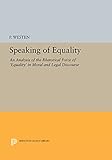Speaking of Equality : An Analysis of the Rhetorical Force of 'Equality' in Moral and Legal Discourse / P. Westen.
Material type: TextSeries: Studies in Moral, Political, and Legal Philosophy ; 1131Publisher: Princeton, NJ : Princeton University Press, [2014]Copyright date: ©1990Edition: Course BookDescription: 1 online resource (344 p.)Content type:
TextSeries: Studies in Moral, Political, and Legal Philosophy ; 1131Publisher: Princeton, NJ : Princeton University Press, [2014]Copyright date: ©1990Edition: Course BookDescription: 1 online resource (344 p.)Content type: - 9780691600079
- 9781400861484
- 320.011 22
- online - DeGruyter
- Issued also in print.
| Item type | Current library | Call number | URL | Status | Notes | Barcode | |
|---|---|---|---|---|---|---|---|
 eBook
eBook
|
Biblioteca "Angelicum" Pont. Univ. S.Tommaso d'Aquino Nuvola online | online - DeGruyter (Browse shelf(Opens below)) | Online access | Not for loan (Accesso limitato) | Accesso per gli utenti autorizzati / Access for authorized users | (dgr)9781400861484 |
Frontmatter -- CONTENTS -- PREFACE -- INTRODUCTION -- Part One: The Ordinary Meaning of 'Equality' -- Introduction -- ONE. DESCRIPTIVE EQUALITY -- TWO. MATHEMATICAL EQUALITY -- THREE. PRESCRIPTIVE EQUALITY -- FOUR. EQUAL TREATMENT -- FIVE. SUMMARY -- Part Two: Some More Equal than Others -- Introduction -- SIX. ANTIDISCRIMINATION RIGHTS -- SEVEN. PER-CAPITA DISTRIBUTIONS -- EIGHT. EQUAL OPPORTUNITY -- Part Three: Precepts of Equality -- Introduction -- NINE. THE FORMAL PRINCIPLE OF EQUALITY -- TEN. THE PRESUMPTION OF EQUALITY -- Part Four: The Rhetoric of Equality -- Introduction -- ELEVEN. THE PERSUASIVENESS OF EQUALITY -- CONCLUSION -- BIBLIOGRAPHY -- INDEX -- Backmatter
restricted access online access with authorization star
http://purl.org/coar/access_right/c_16ec
Aristotle noted that "equality" is the plea not of those who are satisfied but of those who seek change, and the word has long been invoked in the name of social reform. It retains its force because arguments for equality put arguments for inequality on the defensive. But why is "equality" laudatory and "inequality" pejorative? In this first book-length analysis of the rhetorical force of equality arguments, Peter Westen argues that they derive their persuasiveness largely from the kind of word that "equality" is, rather than from the values it incorporates.By focusing on ordinary language and using commonplace examples from law and morals, Westen argues that equality is a single concept that lends itself to a multiplicity of conceptions by virtue of its capacity to incorporate diverse standards of comparison by reference. Equality arguments draw rhetorical force in part from their tendency to mask the standards of comparison on which they are based, and in so doing to confound fact with value, premises with conclusions, and uncontested with contested norms.Originally published in 1990.The Princeton Legacy Library uses the latest print-on-demand technology to again make available previously out-of-print books from the distinguished backlist of Princeton University Press. These editions preserve the original texts of these important books while presenting them in durable paperback and hardcover editions. The goal of the Princeton Legacy Library is to vastly increase access to the rich scholarly heritage found in the thousands of books published by Princeton University Press since its founding in 1905.
Issued also in print.
Mode of access: Internet via World Wide Web.
In English.
Description based on online resource; title from PDF title page (publisher's Web site, viewed 30. Aug 2021)


